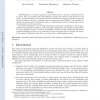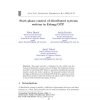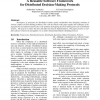104
Voted
CORR
2010
Springer
15 years 2 months ago
2010
Springer
Self-stabilization is a versatile approach to fault-tolerance since it permits a distributed system to recover from any transient fault that arbitrarily corrupts the contents of a...
109
Voted
CORR
2010
Springer
15 years 2 months ago
2010
Springer
Self-stabilization is a versatile approach to fault-tolerance since it permits a distributed system to recover from any transient fault that arbitrarily corrupts the contents of a...
CORR
2010
Springer
15 years 2 months ago
2010
Springer
This paper presents a realization for the reliable and fast startup of distributed systems written in Erlang. The traditional startup provided by the Erlang/OTP library is sequenti...
1
posts
with
311
views
311
views
130
click to vote
SIGIR
2010
ACM
15 years 2 months ago
2010
ACM
It is crucial to study basic principles that support adaptive and scalable retrieval functions in large networked environments such as the Web, where information is distributed am...
103
click to vote
CCGRID
2010
IEEE
15 years 3 months ago
2010
IEEE
With the increasing functionality and complexity of distributed systems, resource failures are inevitable. While numerous models and algorithms for dealing with failures exist, th...
147
Voted
CASCON
1996
15 years 3 months ago
1996
Monitoring distributed systems involves the collection, analysis, and display of interactions among managed objects. These functions are carried out by the components of a monitor...
WSC
1997
15 years 3 months ago
1997
The modeling of computer systems, particularly distributed systems, is presented with an emphasis on the system characteristics that are important to the model and some general me...
109
click to vote
IM
1997
15 years 3 months ago
1997
Policies are a means of influencing management behaviour within a distributed system, without coding the behaviour into the managers. Authorisation policies specify what activitie...
135
click to vote
PDPTA
2000
15 years 3 months ago
2000
Developers of programs for distributed systems spend considerable time designing solutions to various complex decision-making problems. The work described in this paper applies th...





